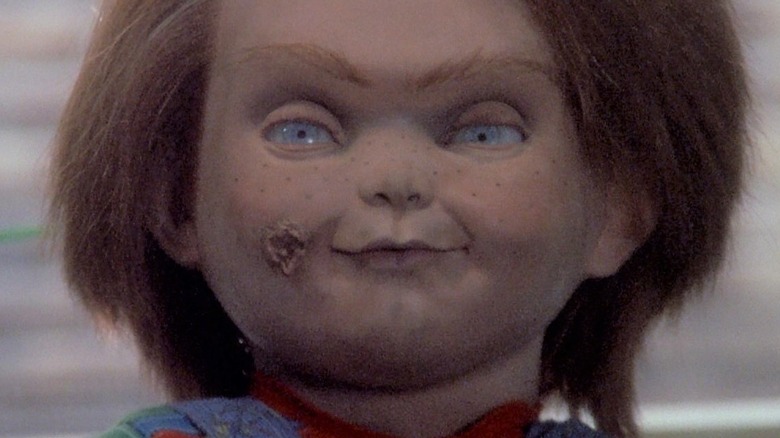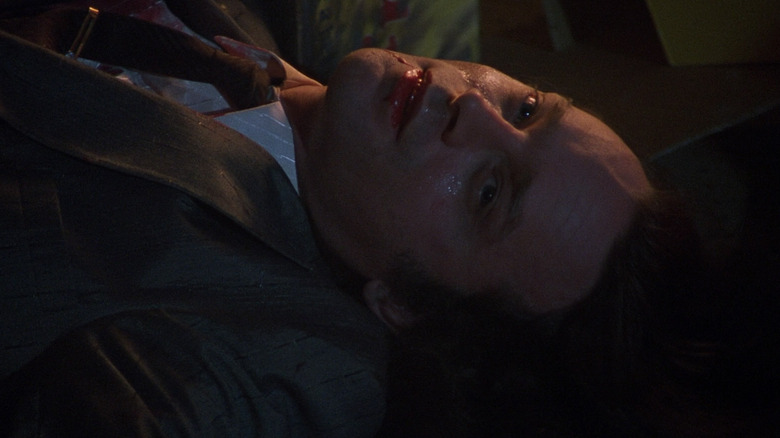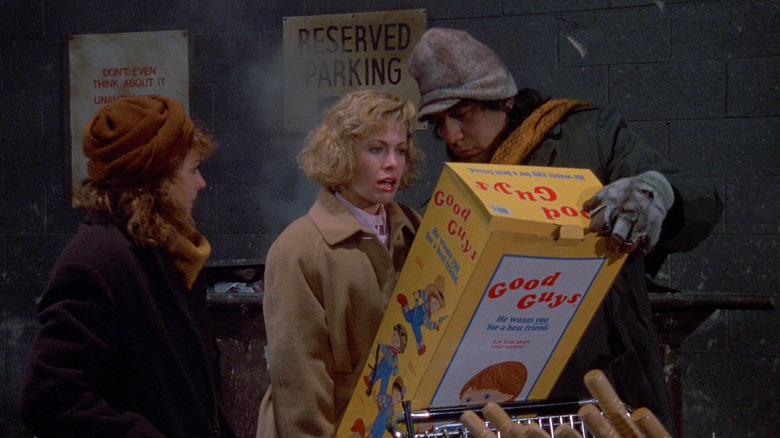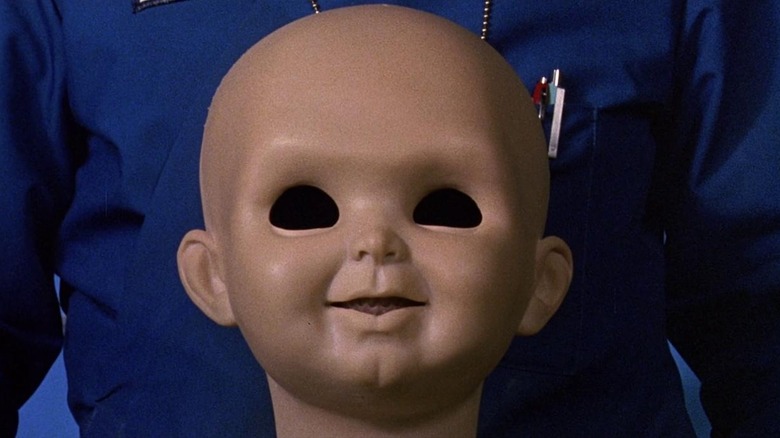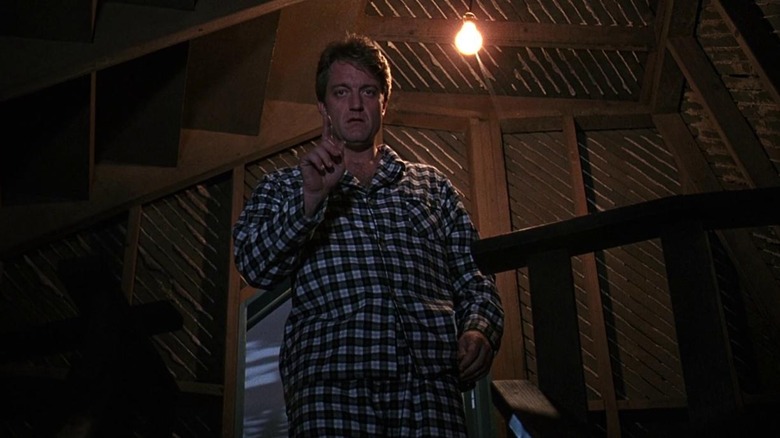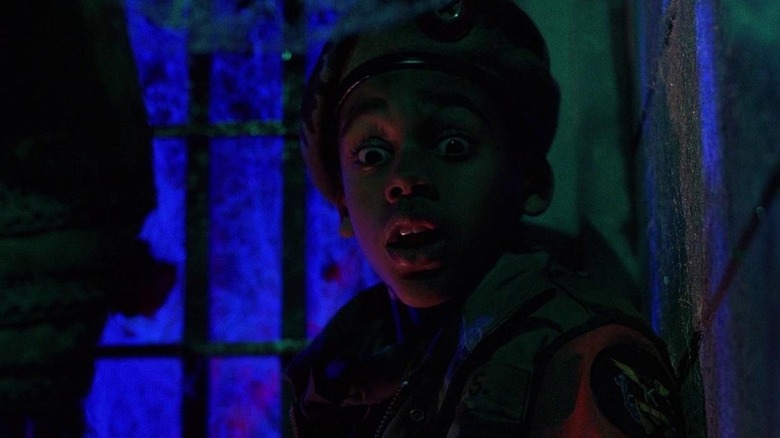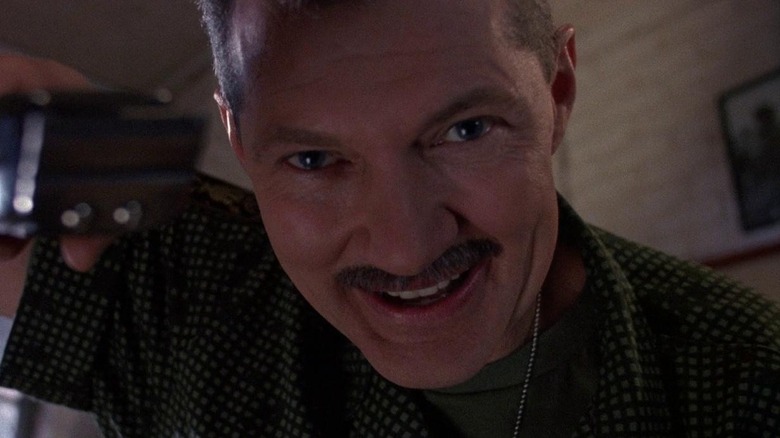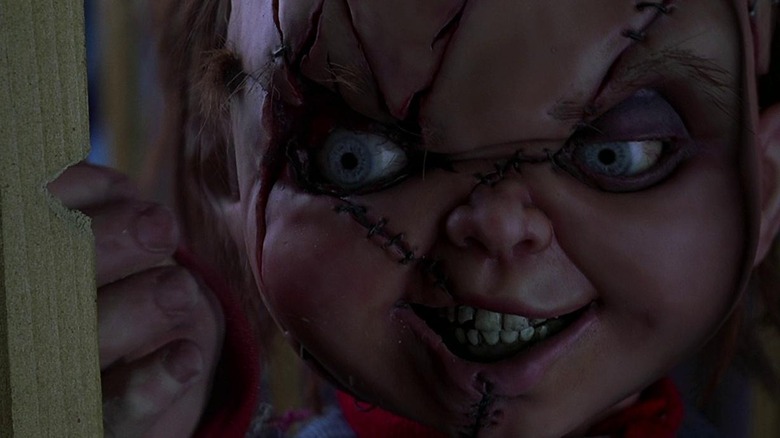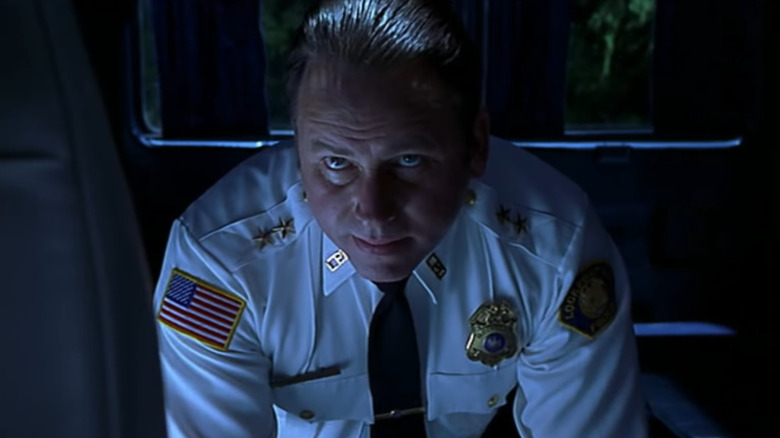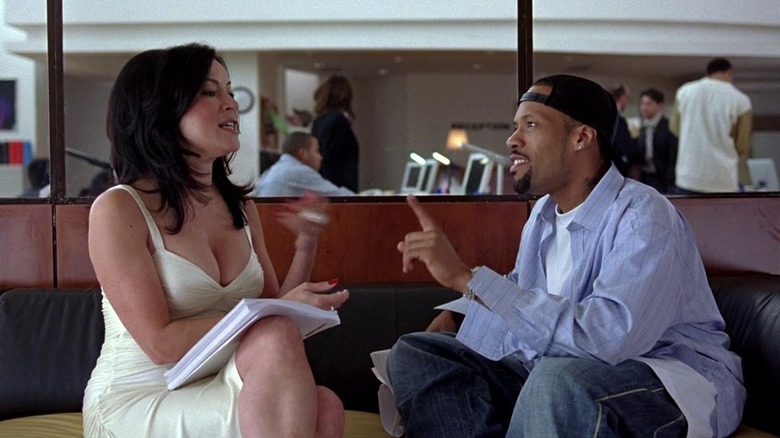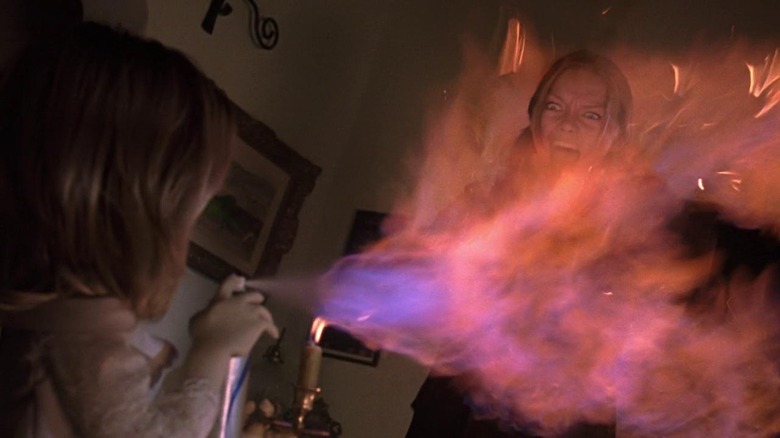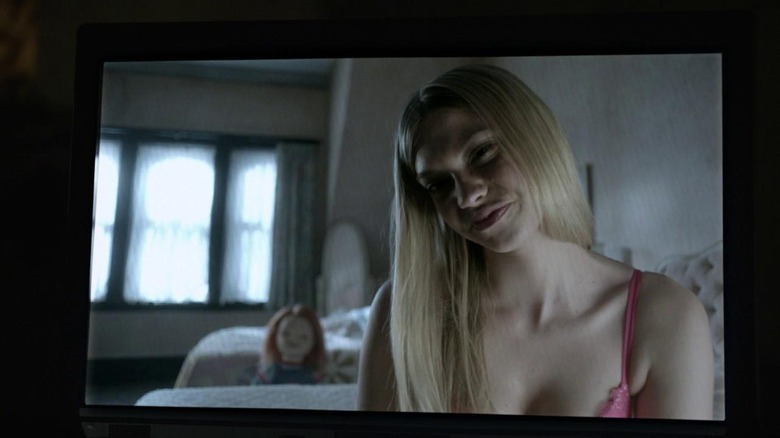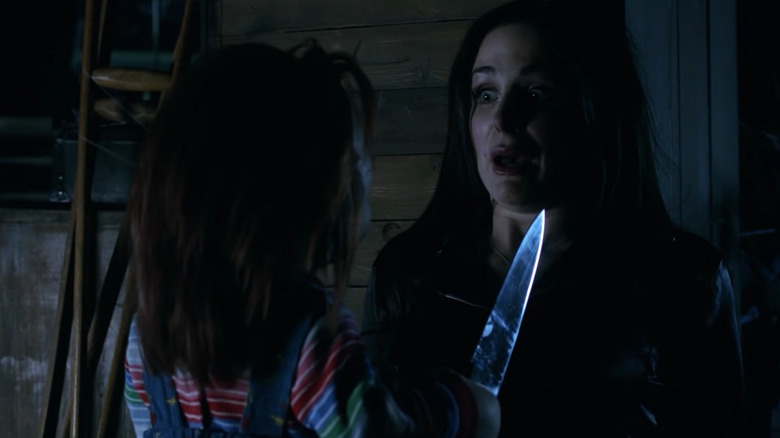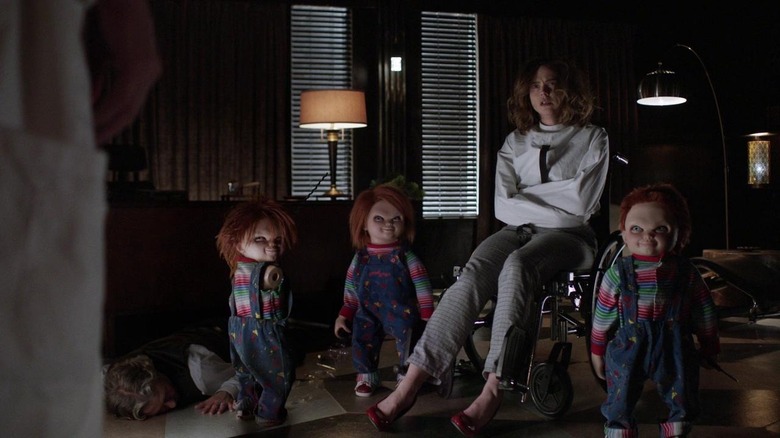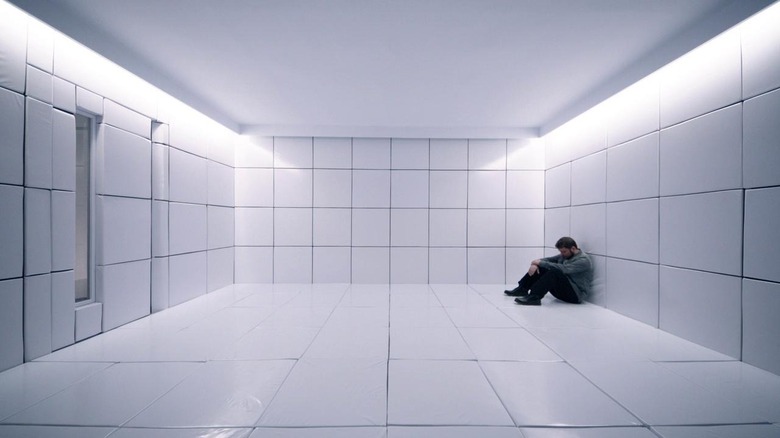Worst Decisions Child's Play Characters Made In The Franchise
One of the joys of slasher films is that characters tend to make lousy, often life-ending decisions. Who among us doesn't relish shouting "don't go in there" at their TV, smug in the knowledge that — given the chance — you would have simply not gone in there? But the "Child's Play" franchise is cut from a different cloth. Even from its inception, the horror series has always had a self-aware glint in its eye. After all, when your film is about a Cabbage Patch Kid/Teddy Ruxpin doll possessed by the stab-happy soul of a feisty serial killer, you can't take yourself too seriously.
This isn't to say that characters in the "Child's Play" films don't make bad choices. Far from it. Rather, their bad decision-making is simply a little more spicy and self-conscious than you'd expect. These lapses in judgement aren't the result of lazy writing, far from it. They're often relatable and revealing! Which is a lot more than most bumbling sacrificial lambs in slasher films can say. With that all said, let's dive in to the worst decisions made by characters in the "Child's Play" films.
Beware spoilers for the entire "Child's Play" franchise.
Charles Lee Ray uses voodoo magic he doesn't totally understand
This is the bad decision that started it all. There's a good chance that if serial killer Charles Lee Ray (Brad Dourif) really knew what he was getting himself into on that chilly November night back in 1988, he might've just decided to permanently check out. Tom Holland's inaugural entry in the franchise opens with Charles sprinting down a foggy alleyway with the intrepid Detective Mike Norris (Chris Sarandon) in hot pursuit. Even in media res, it's clear that Charles has been a thorn in the Chicago police department's side for some time; the chase is frantic and sweaty, ultimately forcing the desperate killer to duck into a closed toy store. He's been shot already and after Norris nails him again in the chest, his odds are looking worse and worse. Stumbling through the store, leaving a sticky trail of blood in his wake, Charles Lee Ray comes to the inevitable realization: He's dying.
Or is he? As we later learn, the Lakeshore Strangler has learned a little voodoo from John "Dr. Death" Bishop. He knows the rites to transfer his soul into another being. But, lacking in vessels, Charles decides to settle for the next "best" thing — a Good Guy doll. Now, would Charles have gone through with it had he known the consequences? That he would be trapped in the form of a doll forever unless he transferred his soul into the first person he revealed himself to? That if he failed to do so, his new plastic body would become increasingly more ... mortal? The "Child's Play" franchise eventually did away with many of these more stomach-churning consequences. But as things stand in 1988 original, it's safe to say that Charles' distressed decision was a very bad call.
Karen Barclay buys a back-alley toy from a crime scene
Look, we don't mean to proverbially kick Karen Barclay (Catherine Hicks) while she's down. The woman is a single mother just trying to go the extra mile for her young son's birthday. Financial times are tough, and 6-year-olds don't totally understand things like "rent," "bills," and "minimum wage." On the one hand, it's tempting to look at Andy's sulking pout and chide the youngster for failing to find contentment with his mom's totally reasonable promise. This is the hottest doll out there right now. It just came out. And she's more than willing to get it for him once she's saved up the money.
But, on the other hand, you can totally understand why Karen would do whatever it takes to bring a smile to Andy's sweet little face. But the road to the "sent to a mental institution for blaming a string of murders on a killer doll" is paved with good intentions, as it were. Buying a doll from an unhoused dude who nabbed the merchandise from a crime scene is bad enough. What really cements Karen's decision as an all-time "whoops" is the fact that this particular Good Guy doll contains the violent, foul-mouthed soul of serial killer Charles Lee Ray.
Play Pals Corporation reassembles Chucky's remains
In the interest of fairness, it's worth noting that, on paper, Play Pals Corporation didn't ask for any of this. They're just a humble, child-pandering, capitalistic, 1980s toy manufacturer — no more insidious than you'd expect of a company whose bottom line relies on the wallets of doting parents. You can almost hear the public relations machine chugging along, and to be fair, there's some truth to it. Play Pals Corp. didn't actually have anything to do with the events of the first film. And right from the jump of 1990's "Child's Play 2," it's clear that the company is reeling from the publicity nightmare of having its new, hot toy associated with a string of murders.
We totally understand Play Pals wanting to preserve its image after the tragic events of "Child's Play." But the company's decision to literally preserve the actual doll associated with the massacre isn't just perplexing, it's a world-class bad idea. The film opens on a montage of toymakers reassembling Chucky's charred remains. Their objective is to prove that the company didn't tamper with the product. And, sure enough, their search shows what appears to be a totally normal, un-tampered-with Good Guy doll. Naturally, in what can only be described as "slasher movie logic," an electrical accident zaps the now finished doll (killing the poor engineers in the process). And, just like that, Chucky's back, and this time, it absolutely is the fault of the Play Pals Corporation. Great job, guys.
Phil Simpson dismisses Andy
Right from the start in "Child's Play 2," Phil Simpson (Gerrit Graham) has his hackles up about fostering Andy Barclay (Alex Vincent). He asks the social worker if he and his soft-hearted wife, Joanne (Jenny Agutter), are qualified to care for a child who thinks his doll, possessed with the soul of a serial killer, went on a murder spree. This is a legitimate concern, it turns out. Because while Joanne is clearly a kind and patient caregiver, Phil just seems to be along for the ride. You probably shouldn't be a foster parent if you say that you'll "get used" to a traumatized child the way you'd "get used" to a new couch.
Where Phil really slips up (pun intended, unfortunately) comes later. Resenting Andy and begrudging his presence is one thing. Actively dismissing and gaslighting a psychologically troubled child on the other hand is wildly bad form. And, as it turns out, a death sentence. When Andy takes matters into his own, child-sized hands, venturing into the Simpson's basement armed with an electric turkey-carver, Phil surprises him at the top of the stairs. Furious and un-empathetic as ever, Phil immediately assumes the worst. As a result, he makes himself an easy target for Chucky's longshore hook, plummeting downwards and breaking his neck. If only Phil had been more accepting, Andy wouldn't have had to take things on himself ... and Phil would have survived to grump it up another day.
Tyler never questions Chucky's motives for an instant
We'll say this much about Tyler (Jeremy Sylvers) of "Child's Play 3:" He's a sweet kid. But let's be real, he's no Andy. When Andy was Tyler's age, he had the wherewithal to reject Chucky's gruesome giggles and creepy demands to play "hide the soul." But not Tyler. Tyler's just about as innocent as they come. Which makes his willingness to go along with everything Chucky says all the more heartbreaking. Unlike other bad decisions on this list, Tyler's failure to question his murder doll's motives doesn't result in his death. But it does expedite and help along the deaths of a number of other folks, causing carnage and suffering along the way for plenty of other mostly innocent souls at Kent Military Academy.
What ultimately qualifies Tyler's gullibility as a franchise worst decision is how many times he's explicitly told that he's being played for a fool. Andy had to navigate this horror show all on his own. Tyler has an older, wiser peer to tell him not to trust the obviously evil murder doll. And yet, there goes Tyler, happily going along with just about every devious whim in Chucky's playbook pretty well right until the bitter end. Tyler isn't the last character to get played by Chucky. But compared to his peers, he has the fewest excuses, which earns this sweetheart a spot on this list.
Sergeant Botnick tries to give Chucky a haircut
Everyone knows that messing with Chucky while he's in "doll mode" is a fast way to put a target on your back. So, when Kent Military Academy's certified maniac/hairdresser Sergeant Botnick tries to give Chucky's red locks a new look, he's basically signing his death certificate.
Messing with Chucky's hair is obviously a bad move for a number of reasons. It goes without saying that putting sharp objects anywhere in the homicidal doll's vicinity is a horrible decision. But, as we learn later in the franchise, despite his frantic search for a human vessel ... Chucky's kind of sensitive about his hair. In "Cult of Chucky," one of the Good Guy dolls under Charles Lee Ray's control sports a homemade crew cut that's probably not too far off from what Sgt. Botnick indented to inflict on Chucky in "Child's Play 3." And, wouldn't you know it, the other Good Guy dolls pity the heck out of the poor jarhead-looking Chucky. You'd think getting a degrading haircut is a fate worse than life-after-death as far as Chucky's concerned.
Long story short, as much as we hooted and hollered every time Andrew Robinson mugged it up on-screen, his turn as the scene-chewing barber was fatefully cut short, as it were. It's too bad, really. After Tiffany Valentine, Botnick is arguably the character with the most in common with Chucky. Unfortunately, his penchant for mischief and mayhem puts Botnick on the wrong side of a razor blade.
Tiffany locks Chucky up when he denies her affections
We want to make it abundantly clear that this is a pro-Tiffany Valentine space. We have nothing but admiration and respect for Jennifer Tilly's turn as Charles Lee Ray's sadistic former lover. And we certainly feel for the girl in "Bride of Chucky" when she goes through all the trouble of bringing her butchered beau back to life (which involves, among other things, killing a police officer and performing a voodoo ritual) only for him to laugh in her face. She's madly in love with this pint-sized maniac. And to him, their relationship is one big joke. What's a girl to do? Well, if you're Tiffany, you lock up your psychopathic plastic ex-boyfriend in a playpen. Why, exactly, did Tiffany have a playpen with a padlock to begin with? She's a woman of particular tastes ... it's best not to ask.
There are a few certainties in this world, and right after death, taxes, and gravity, there's "Chucky getting out of confined spaces." Whether it's a grave or a closet, Chucky always finds a way out. And Tiffany's playpen/prison is no different. If she hadn't rubbed salt in the wound by bringing him a plastic playmate, maybe he would have gone easier on her. But humiliating an insecure homicidal maniac is a surefire way to an early grave. On the plus side, Chucky decides that Tiffany's infraction deserves a fate worse than death — being trapped in a doll-body, just like him.
Chief Warren Kincaid plants weed in Jesse's van
It is a truth universally acknowledged that jerks do not fare well in slasher films. Especially jerks who go sticking their noses where they don't belong. For example, take Chief Warren Kincaid (John Ritter), who went to the Phil Simpson school of "Child's Play" foster parenting. He treats Jade (Katherine Heigl) more like a ward or a felon on house arrest than his niece. And yet, while he probably thinks he's doing what's best for her, all of his attempts at "parenting" Jade lead to misery and, eventually, his death.
See, Chief Kincaid isn't above using his position in the police force to control Jade's life, especially if it means keeping her away from Jesse (Nick Stabile), her boyfriend from the other side of the tracks. Early in "Bride of Chucky," we see the stick in the mud use one of his underlings to pull the couple over to spoil their prom night. While that's enough of a dirtbag move, later, we see him plant marijuana in Jesse's van in an attempt to keep him away from Jade.
Unbeknownst to the corrupt cop, Tiffany and Chucky are also in the van. And they need Jesse in order to get to the final resting place of Chucky's human remains. In other words, Chief Kincaid needs to die. And because "Bride of Chucky" marked the franchise's delightfully cheesy heel turn, his death (a bunch of nails to the face) is accompanied by a leering reference to Pinhead of "Hellraiser" fame. We wouldn't be so ghoulish as to say he "had it coming." But being such a wet blanket in a "Child's Play" film is a fatal move, bud.
Jennifer tries to sleep with a director to land a role
Easily the goofiest entry in the franchise, "Seed of Chucky" is absolutely riddled with poor decision-making. This isn't necessarily a bad thing. Trust us, on a re-watch, you'll agree: Reports of the film's bad-ness have been grossly exaggerated. In hindsight, franchise scribe Don Mancini's directorial debut is a lot more interesting, bold, and funny than the vast majority of its peers. But back on topic.
If there's one, singular ultra-bad decision in this film, it's Jennifer Tilly (playing herself) deciding to sleep with a director, Redman (also playing himself), in order to get a role. Despite the barbed nature of the set-up, the whole affair is clearly played for laughs, with Tilly's Hollywood image as a sexpot coming into clear and hilarious contrast with the role she desperately wants in order to revitalize her career: the Virgin Mary.
Tilly is warned repeatedly by her assistant, Joan, that coercing a director into a role via sex is crossing a line. But no one could've guessed what the exact consequences of crossing that line would be. Without saying too much ("Seed of Chucky" remains one of the franchise's most criminally underseen entries), let's just say that her pursuit of a role defined by a virgin birth becomes horrifically ironic.
Assistant Joan goes back to Jennifer after getting unjustly fired
Dear, sweet, innocent Joan — we hardly knew ye.
Indeed, while "Seed of Chucky" is largely overpopulated with creeps, cons, and killers, Hannah Spearritt's Joan is a genuinely nice person whose out-of-place kindness is rewarded with the malice you'd expect of the wackiest film in the "Child's Play" franchise. Joan is the long-suffering assistant of Jennifer Tilly (who, and we cannot stress this enough, plays herself — it's brilliant). You get a sense that Joan really cares about Jennifer as a friend, despite how callous and cruel her prima donna boss can be. So, truth be told, when Jennifer fires Joan in a tearful temper tantrum, it's a blessing. Now Joan will be leagues away from all this madness, right? She got fired for urging her boss not to sleep with a director, that's the moral high ground. Surely she can ride off into the sunset and be at peace.
Sadly, "Seed of Chucky" has other plans. See, Joan is really, really nice. And that niceness leads to her demise. When Jennifer finds herself in a literal nightmare (including but not limited to killer dolls, a dead man, and an unexplainable pregnancy), she calls Joan. And Joan's helper instincts cannot be ignored. Unfortunately, those same instincts see her fired ... again ... by a blow torch.
Barb and Jill have a sexy video chat while Barb's husband and daughter are in plain sight
Sexual activity has long been a kiss of death in slasher films. And while the "Child's Play" franchise has tended to air on the more progressive side of things (in large thanks to the franchise's openly queer writer Don Mancini), infidelity is still a bridge too far.
Barb Pierce (Danielle Bisutti), the older sister of "Curse of Chucky" heroine Nica (Fiona Dourif), isn't the most likeable character. And if her resentment towards her younger sister doesn't rub audience members the wrong way, her very clumsy affair with her nanny, Jill (Maitland McConnell), absolutely will. Despite having a pretty loving husband (who's willing to work himself raw slinging lattes at Starbucks to make ends meet) and a lovely daughter, Barb's willing to risk it all ... in what might be the most "asking to get caught" way possible.
As Barb's in bed with her snoring husband and Jill shares a room with the snoozing kid, Alice (Summer H. Howell), the pair engage in a good old-fashioned erotic video chat. The irresponsibility is off the charts before we even start considering how this kind of behavior tips the scales in a slasher setting. If Barb and Jill hadn't already secured their one-way tickets to the pointy end of Chucky's knife, their wildly amoral cyber-rendezvous sealed the deal.
Barb puts a kitchen knife right next to Chucky's hand after disarming him
A couple of characters on this list have already ticked some of Chucky's "if you do this, I'm absolutely going to kill you" boxes. We've got Tiffany humiliating her ex-boyfriend and Sgt. Botnick screwing around with Chucky's 'do. But Barb (Danielle Bisutti), the aforementioned jerky big sister to the much kinder and resourceful Nica, takes the cake.
While in the attic searching for her missing daughter, Alice, Barb takes a minute to search for the limp Good Guy doll that supposedly harbors a nanny-cam planted by her smug husband. But while searching for the incriminating evidence of her affair with their daughter's live-in babysitter, Jill, Barb happens upon a different, sharper find — a big ol' kitchen knife. At first, Barb takes the knife away from Chucky and examines it. This is the smartest thing Barb does in the whole film.
What follows, is her low point, as far as decision-making is concerned. Barb takes the knife and sets it down right next to the red-headed doll, sealing her doom. Before you know it, Barb is short one eye and toppling down the stairs faster than you can say "you gave Chucky a knife, what did you think was going to happen?"
Nica moves to a minimum-security prison
Overall, the latter two films in the OG "Child's Play" franchise are markedly smarter than their predecessors. To be clear, there's absolutely nothing wrong with the boneheaded moves of the more campy predecessors, but smarter characters mean that fewer decisions qualify as truly heinous. That said, Fiona Dourif's Nica moving to a minimum-security prison in "Cult of Chucky" is a terrible, wildly consequential choice. It's not super clear if Nica gave her fully informed consent for the transfer. She is, as we later learn, being abused by her overseer, Dr. Foley (Michael Therriault). It's totally likely that the nefarious M.D. wanted Nica in an environment where he had more oversight so that he could continue to be a massive creep.
Either way, Nica's move to a medium-security institution means that she can now receive visitors. This means that she's now a sitting duck for Tiffany Valentine and Chucky's dastardly plan. Soon, Good Guy dolls start trickling in like a rat infestation, and the whole facility descends into chaos. Had Nica lived out her days in total isolation, Chucky wouldn't have gotten access to what he wanted all along — her.
Andy institutionalizes himself on purpose to get close to Nica
The reveal of adult Andy Barclay (Alex Vincent) during the post-credits sequence of "Curse of Chucky" is one of the highlights of the franchise. Our original protagonist has returned, hardened by the whetstone of military academy and consumed with a clear, unwavering purpose — keep Chucky from harming anybody else. And Andy plays a minor but tantalizing role in "Cult of Chucky," where his mission pulls him magnetically towards Nica, another survivor of the plastic psychopath. When his attempts to contact her are thwarted by her overseers, Andy drives up to the psychiatric facility himself. Denied again, he forcibly commits himself by assaulting a security guard.
While the litany of Chucky clones reign havoc, Andy waits patiently in a padded cell. As he'd planned, the Good Guy doll he'd mailed earlier (now possessed) arrives to do him in. After a scuffle (all that military training still results in a stab or two), Andy yanks the gun he planted out of the doll's gore-filled chest, and now, he plants a good deal of bullets in the sucker for good measure. A few too many bullets, it turns out. Because later, when the now-possessed Nica arrives, Andy's out of ammunition. Nica rides off into the sunset, leaving Andy to rot in his fluorescent cell. The best-laid plans, eh?
